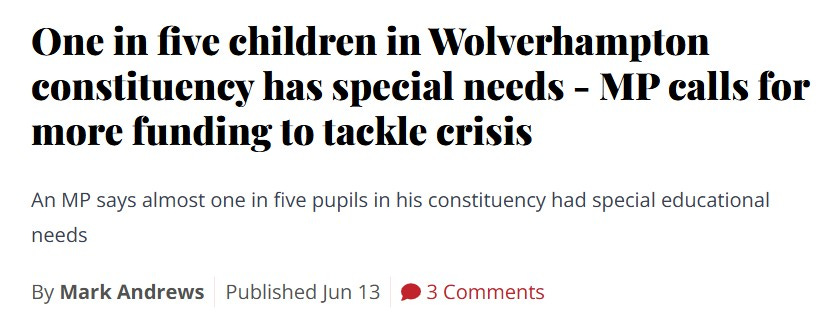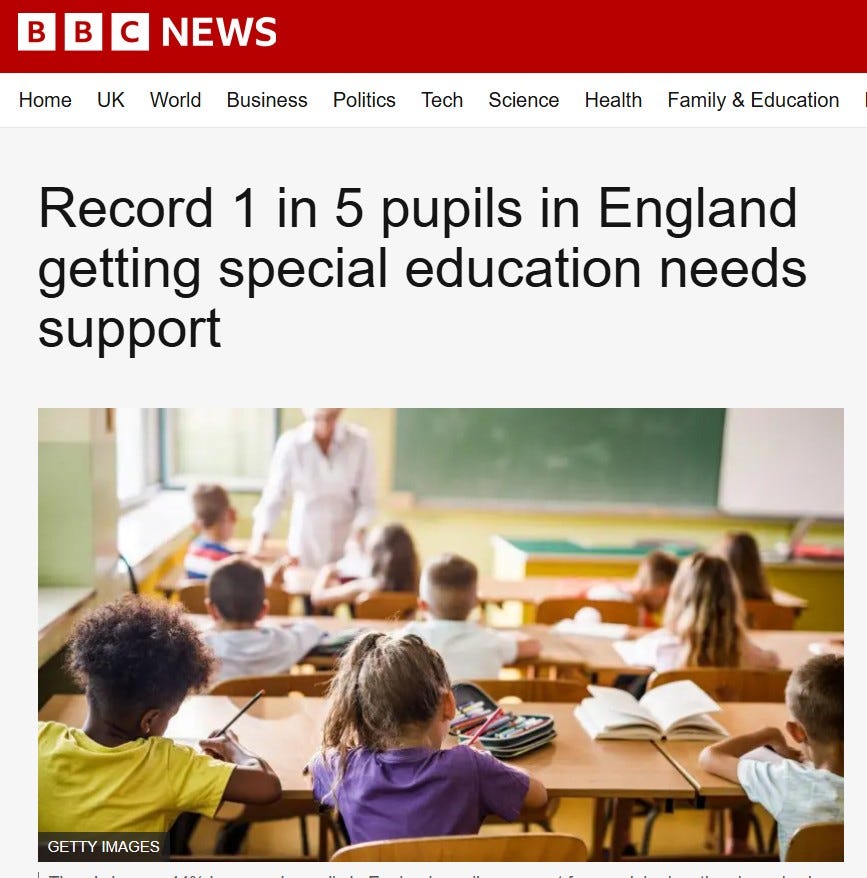Contemporary ecologists use the concept of ‘shifting baselines’ to capture the way that human beings rapidly lose any collective memory of how things were in the past. We no longer experience the wonder of wildflower meadows, ancient woodlands and fertile seas – especially if we live and work in concrete jungles – so we do not know what is lost. We accept the unacceptable because it is normal.
The parallels with the autism epidemic are striking.
Rising rates of autism and related disabilities are crippling the next generation. Our schools are in crisis. The NHS has waiting lists that only get longer. Employers struggle to find the workers they need. Our councils are bankrupt because of the cost of it all.
Yet this reality has been normalised. Every scary headline comes accompanied with platitudes about greater awareness and more acceptance. The underpinning paradigm assumes these numbers have always been there and this explains the relentless search for the ‘missing’ girls, women and older men.
In just 20 years, autism awareness has moved from the margins to the mainstream because this is the time it has taken for the epidemic to become the new normal. Rates have gone up dramatically and staff turnover means that people have no memory of the time before autism and the associated special needs crisis in schools.
My husband had a late uncle who worked as a paediatrician, and he never saw a child with autism before he retired in the 1980s. Similarly, a late aunt who was a primary school headteacher around the same time in the same place, said the same thing. They never saw autism in their classrooms or clinics.
What ecologists call ‘the extinction of experience’ has allowed the new reality to take hold incredibly fast. People have no experience of anything but the present and we are stuck in a rising tide of SEND (Special Educational Needs and Disabilities) that reflects a rapidly shifting baseline.
New teachers train in an environment where it is normal for a significant minority of pupils to be unable to learn. Up to a third of a primary school class will struggle to sit still and be calm, to listen and follow instructions, to communicate and socialise, to behave properly, to hold a pen, to manage to read and to store information.
Furthermore, teachers see that up to a third of the class – with overlaps between the two groups – will have some kind of health problem with atopic allergies and the risk of anaphylaxis at the top of the list. They will be managing a locked cupboard full of adrenaline pens, asthma pumps, eczema creams and nose sprays for rhinitis, with reams of paperwork to account for it all.
Any classroom will include at least one child whose disabilities are so obvious and severe that teachers and parents will fast-track an assessment and statement about their condition and its implications for an EHCP (Education Health and Care Plan). This process is only for those most obviously in serious need. It is the means to trigger the extra resources needed to employ a teaching assistant or fund a place in a specialist school. The outcomes often trigger complaints and legal action that are emotionally and financially exhausting for parents, schools and the local authorities that pay for it all.
The new normal means that teachers must understand all the developmental disorders now afflicting our kids; Autism, Dyspraxia, Dyslexia, Dyscalculia, Attention Deficit Hyperactive Disorder (ADHD). Added to these are the emotional disorders such as anxiety, depression, Obsessive Compulsive Disorder (OCD) and Pathological Demand Avoidance (PDA) also called Oppositional Defiant Disorder (ODD). All of these involve a slew of paperwork, ongoing meetings and many complaints.
This is NOT the classroom experience of the past and it is NOT acceptable for professionals, so-called experts and politicians to pretend it is normal.
The situation reflects the poor health and wellbeing of our children and ongoing attempts to blame it on ‘over-diagnosis’ or ‘benefit culture’ or ‘bad parenting’ will not solve the problem. We cannot wish it away.
On Friday 13th June, the Wolverhampton Express and Star reported on the work of Warinder Juss MP who had researched the scale of the SEND crisis affecting children, families and schools in his constituency (of Wolverhampton West). He found that 1 in 5 (20%) children of school age – 9000 young people - have special educational needs. He told reporters that rates had gone up by 140% in a decade and funding had failed to catch up.
The article ended with the MPs’ stirring rhetoric as he said: “We have to take bold, decisive steps to reform our special educational needs system, to ensure that every child, no matter their needs or background, receives the support they so rightly deserve.”
There is no indication of HOW this can be done without either increasing the funding or reducing support for those who already have it and/or cutting back on existing statutory entitlements to services.
The day before, Kate McGough, BBC Education producer wrote an article confirming the 1 in 5 rate.
Nationally, this equates to 1.7 million children, and the rate has gone up by 5.6% (an extra 93,700 pupils), over the year.
Almost a third of these, half a million pupils, have EHCPs which reflect the greatest level of need. Most of these are awarded for a diagnosis of Autistic Spectrum Disorder (ASD) and the levels of need are growing not shrinking in the group of children involved.
Furthermore, as many as 24,000 SEND tribunal cases were processed in the year to April 2025 - the highest number on record – a clear indication that local authorities are trying to resist the demand for EHCPs and/or expensive specialist help.
On Friday 13th June 2025 the Guardian reported that the combined deficit associated with local authority spending on SEND was likely to exceed £5 Billion which has knock-on effects across the public sector. Journalists Patrick Butler, Abby West and Richard Adams wrote:
“At least 15 councils will have accumulated Send deficits exceeding £100m by next March, with one in four predicting debts of more than £50m. Two-thirds overspent their allocated Send budgets last year, with 18 councils exceeding them by more than £30m.
An accounting measure, known as a statutory override, has allowed councils to keep the accrued deficits off their balance sheets. The override is due to end on 31 March, leaving large numbers of councils in effect insolvent.
Councils declaring effective bankruptcy would affect all areas of provision, shed hundreds of jobs, and force them to sell off assets such as buildings and land.
Tim Oliver, chair of the County Councils Network, said: “The mounting Send service deficits are the burning platform for many local authorities yet there was no resolution in the spending review.”
That burning platform is the next generation.
Tweaking the law, policy and budgets will do nothing to stem the rising tide of demand.
Education Secretary Bridget Phillipson MP has a review underway, and the Government is promising a paper on reform for the Autumn. Their Plan for Change is proselytised as the coming new dawn, but it will do nothing to address the root of the problem.
Someone sensible needs to stand up and say we need a change of direction. Something has gone very wrong. Too many of our precious children are in poor health and are unable to learn. This is a national emergency, and the ONLY lasting solution is to stop causing the problem in the first place.
This common sense might come too late to shift the baselines back to where they should be, but there is still time for our children’s children to be protected from the immuno-neurological problems afflicting so many today.
Sharing the route to good health is the most powerful and important thing we can do. The future of our species depends on it.
Please subscribe, share and comment to help build momentum for change.







Why is there so little interest in why our children are being so damaged?
For one, the British still assume that medical authority knows best, the BBC is reliable, the government is telling the truth. See Covid. So no pressure from below, and affected parents are too exhausted to campaign.
Second, the worship of money means that saleable drugs are prioritised in medicine. This corrupts the whole. Looking for reasons and prevention produces no profit. See childhood vaccination in the US for blatant abuse of children for profit.
Thirdly, it is possible that the great silence on "autism" exists because pharma already knows some of the answers but doesn't want to face them. Too much loss of face and status. For example, some studies suggest a link between some ASD cases and induction at birth - a battering of the brain perhaps, birth brain injury in some exceptional cases. The medical reaction was - can't be. We've been doing it for years. Too uncomfortable a thought.
You are so right Anne! It has been an incredible shift in such a short time.